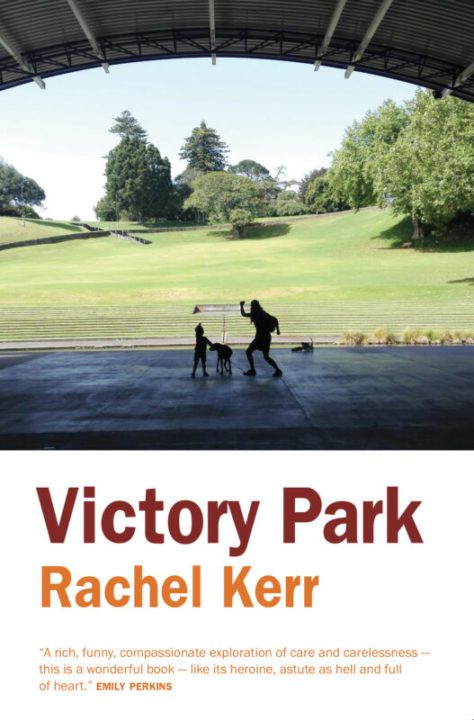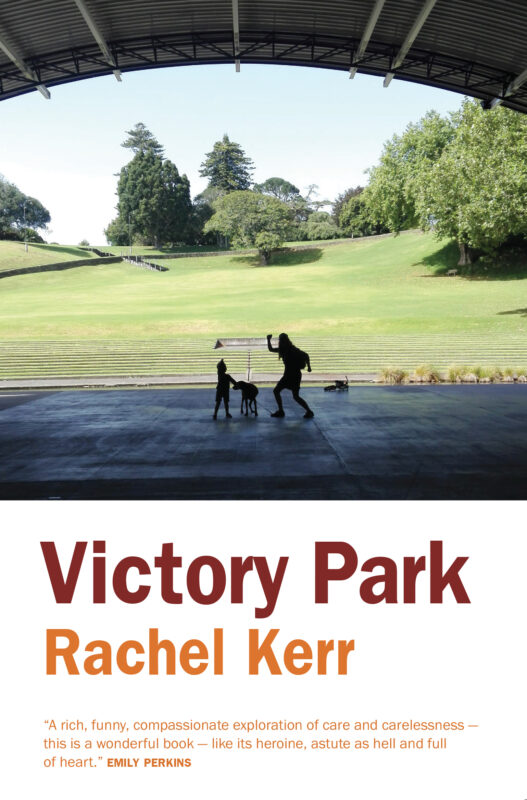Victory Park

Victory Park by Rachel Kerr. Wellington: Mākaro Press (2020). RRP: $35.00. Pb, 246pp. ISBN: 9780995111059. Reviewed by Rachel Smith.
Victory Park is Kara’s story, a young woman living in a block of council flats from which the novel takes its title. When we meet her, Kara is moving through life as best she can, her day-to-day existence governed by her son, her finances and her grief. Into this world comes Bridget – moneyed, outwardly kind and new to the council flat scene. Kara is slowly pulled into Bridget’s world and we are taken along for the ride. They become friends, close in the way that these types of brief and intoxicating friendships mark our lives.
The majority of the novel is set in and around Victory Park, and populated with the people who live there. There are some great scenes: Kara and a friend cleaning up the filthy flat of the elderly, and Edwin, Kara and Bridget sneaking into the athletics track to take their kids for a run around. It’s everyday stuff that slowly builds a rich picture of Kara’s world. There is a straight-forward gentleness throughout the novel, present in the way each scene is written and how one chapter leads onto the next.
“On their way home, a man with sandpapery skin and wisps of hair stuck to his skull wheeled his bicycle up next to them as they stood waiting to cross at the lights. ‘Good morning,’ he said. Several plastic bags dangled from his handlebars, filled with unknown objects, and his bike seat was covered by another bag, tied around the rust-encrusted base. He untied one of the bags, pulled out a wad of faded and tatty copies of the local community newspaper and offered them to Kara.” (p. 56)
The plot in itself holds little surprise. As things begin to fall apart, we know what is coming: that at some point Kara will lose out in her friendship with Bridget. The differences between the two women and the worlds they come from provide the main theme of the novel, which looks closely at the values of those who have and those who have-not[TC1] and the power divide this creates. Encounters are nicely drawn, such as the well-meaning woman Kara works for who invites Kara and her son over for dinner, without thinking of the impact the extra bus fares will have on their tight budget.
It is in the character of Kara, though, that this novel shines. Kerr writes with empathy and understanding; we don’t pity Kara’s circumstances but instead admire the way she tackles the everyday challenges of looking after herself and her family. We are aligned with Kara and like her even as she makes mistakes.
Kerr unravels her main characters deftly and gently, with a realism that adds to the complexity of the story and the characters themselves. The temptation to heighten the drama of events is held back and, as the story progresses, Kara arrives in situations that are familiar and relatable. And not everything is answered; we are left to find our own understanding of Kara’s earlier loss of her partner.
Victory Park is Kerr’s debut novel. I look forward to reading her next.
Rachel Smith
has been published in journals and anthologies in Aotearoa New Zealand and overseas including Best Small Fictions 2020 and Best Microfiction 2019, and is an editor at Flash Frontier. @rachelmsmithnz1 rachelmsmithnz.wixsite.com/rachel-smith

